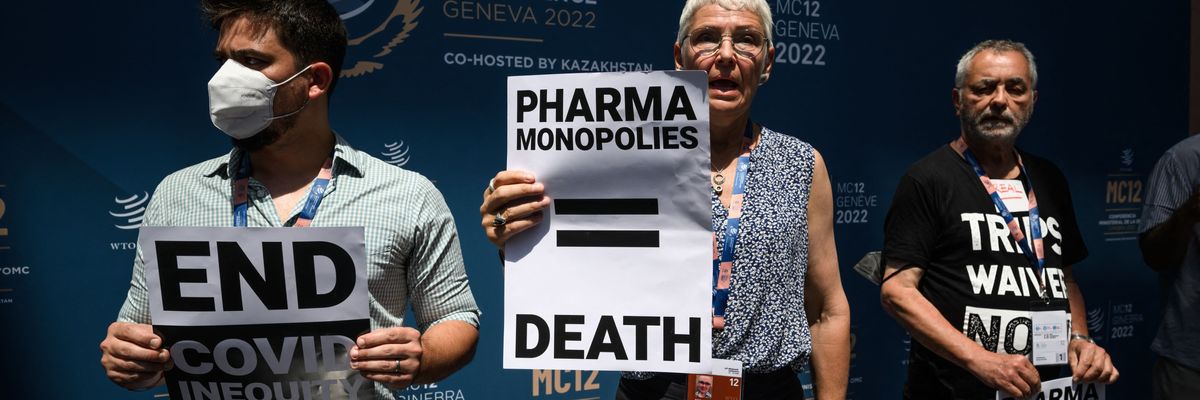The World Trade Organization drew the ire of public health campaigners on Wednesday by failing to loosen the pharmaceutical industry's grip on Covid-19 tests and treatments—and subsequently posting to social media what one group described as a "love letter to patents."
The WTO said Wednesday that "consensus could not be reached" on whether to waive patent rights on coronavirus therapeutics and tests, an announcement that Health Justice Initiative founder Fatima Hassan called "a real slap in the face."
"It's proof of what we have been saying all along, that the WTO does not serve the interest of patients in the Global South because it is hijacked by high-income countries. This decision is a sign of whose lives are seen to matter the most," Hassan toldThe Guardian. "Global South governments are going to have to urgently reconsider what it means to be part of this bizarre one-sided system."
Adding insult to injury, the WTO marked Valentine's Day by posting on X—formerly Twitter—a poem that reads, in part: "Your love is like a patent, so rare and true/A work of art that only I can view/And just like some IP rights, it can never expire/Our love is like a never-ending fire."
"Is this a parody account?" the U.S.-based consumer advocacy group Public Citizen wrote in response. "Or did the WTO really just tweet a love letter to patents... on the same day it decided to prioritize patents over access to lifesaving Covid treatments in developing countries?"
"Rich countries, including our own, were not brave enough to stand up to Big Pharma to save lives."
In the summer of 2022, the WTO reached an extremely narrow agreement that clarified governments' power to use compulsory licensing to increase Covid-19 vaccine production without the consent of patent-holding pharmaceutical corporations.
The deal, condemned as a "sham" by public health campaigners, came after India, South Africa, and other nations pushed for an ambitious patent waiver that would have removed barriers to coronavirus vaccine production and access in developing countries, which were hit hardest by the pandemic.
The agreement that the WTO reached in June 2022 stated that "no later than six months from the date of this decision, members will decide on its extension to cover the production and supply of Covid-19 diagnostics and therapeutics."
But the WTO blew through that deadline as rich countries, including the U.S. and Switzerland, stood in the way of an extension.
Melinda St. Louis, Public Citizen's Global Trade Watch director, said in a statement Wednesday that "we will never forget the critical time the WTO wasted or the untold lives lost because rich countries refused to share the doses and knowledge that scientists around the world and public funds helped produce."
"Big Pharma's unfathomable profit margins would have hardly budged under this modest proposal, but their CEOs and lobbyists did not want the precedent of another WTO decision shifting the needle even slightly away from their sacrosanct intellectual property rights and toward public health," said St. Louis. "The urgency of the proposal became clearer after the U.S. government's October 2023 study revealed the ongoing unmet need for Covid treatments. Yet, rich countries, including our own, were not brave enough to stand up to Big Pharma to save lives."
"We thank South Africa, India, and the many governments, public health organizations, and global justice advocates who supported the original comprehensive waiver and helped shine a light on our trade regime's deadly prioritization of intellectual property over public health," she added.

